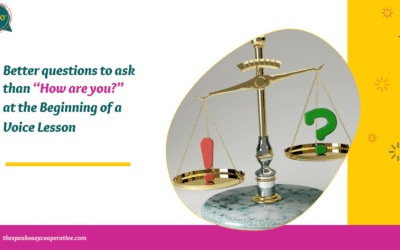…as Classical or Musical Theater singing.
Which is kind of a big fat duh, but also a little difficult to talk about in voice teacher land.
Why? Because our field really does want the best for our students (do no harm!) and some of the sounds and stylings around pop/rock/jazz *seem* to be the antithesis of what traditional Western Classical singing technique would call healthy. This is not a new idea. Dear Lord, we harp all the time, still!
We’ve got a ton of conundrums.
Conundrum one: The trained (usually independent studio) voice teacher is often trained in the canon of Classical sounds, and then asked by their clientele to teach contemporary sounds and stylings. Which most certainly fall outside of the canon.
Conundrum two: How does one put a rubric around a genre that is based on “no rules”?
Conundrum three: If we are to move forward in the technical and performance skills necessary, how do we marry the ideas of health and individual sound?
Conundrum four: How do we honor the rich information brought to us by those who coach this area (such as producers, other performers, and promoters) who are not trained in vocal anatomy, physiology, or technical skill?
A few ideas to un-conundrum us, to get started:
- Listen more. Watch more. Explore more. If you’re a classical or MT hound, dedicate more time to getting to know the genres. You don’t have to like the genres. It’s a critical listening exercise. Take notes on your observations. Try to use words that simply describe what you are hearing, rather than judging what you are hearing.
- Example: “Onsets are aspirated, with fry at the beginning of words that begin with vowels” rather than “the tone is breathy and unsupported.” While the second may be true, it is language that is typically used to talk about what is “ugly” in Western Classical singing. It’s loaded with value judgment.
- I believe a rubric will HELP HEAL SINGERS, rather than destroying their mojo. Without technique and efficiency, pop/rock/jazz singers sacrifice their folds daily. Our rubric should not surround a canon of sound, but a canon of health and efficiency.
- Instead of “Tone” as something to be judged in terms of “chiaroscuro” or “ping”, let us judge it in terms of connectedness to lyric and genre. If it is an old-school country song (think Patsy Cline), and the tone is open, M2/head dominant, and full of consistent vibrato, then it is not appropriate. If the tone is straight and clear, but M1/chest dominant, it’s close but no cigar for a lovely Celtic folk-pop tune. If it’s a techno song about dancing, and the singing is legato… you get the idea.
- Let efficiency be the most important marker. Is there tension and pressed phonation when appropriate? Or is it over-used as a lack of understanding of the instrument? Are the onsets and offsets purposeful? Does the singer use more fold-drying stylings (like whisper) sparingly, showing an awareness that the stereotypical gig will be 2-3 hours long?
- Are stylings motivated? Riffs for riffs sake are still not okay, no matter the genre. Vocal acrobatics are FUN. They can also be annoyingly ubiquitous.
- Pop/rock/jazz is about the individual singing it. Therefore, it should be as individual as the person singing it. A true pop/rock/jazz star may sound similar to others, but will not sound THE SAME. The WORST is when a beginning singer mimics the CD or the original artist. This will require that teachers know the various versions of songs they are teaching.
- I want to be clear: MIMIC IS A WONDERFUL FIRST STEP. I would not be able to do what I do now had it not been for copying EVERY. SINGLE. NOTE. of Whitney Houston songs. Mimic is a tool we use to get us to individuality. In my opinion, it’s good for lesson time, but not for performance time.
- Embrace all aspects of performing this genre. Use and teach with mics. Talk about stage presence and how to woo an audience. Encourage vulnerability. Encourage a unique sound.
- Pop/rock/jazz is all about performance. Get them performing as soon as possible. There is a big difference between someone who is green with an audience, and someone who is seasoned. The only way to practice performing, is to do it. Book coffee shops, retirement homes, heck!, pay to play at Whisky a Go Go if you must, but GET OUT THERE and learn to play with an audience, with no fourth wall.
- Listen to the producers about what is wanted. This music sells because it is POPular. There are markers that will follow this and change with culture. Pop/rock/jazz is the ethos of the time. The style will reflect this. If you are noticing similarities, check the liner notes. Chances are you’ll see a throughline in the production team, somehow. Get to know those folks’ “ear”.
- Embrace the studio engineer with open arms and work WITH them, rather than against them. If you’re in the studio, and the engineer wants more grit, say “YES!” and give the singer a tool/technique to get that sound in a healthy way. You may ask the singer make a face that never in a million years should be seen on stage. You may ask the singer to give a little more vocal capital for three takes, rather than three hours.
The most important thing is that we support our singers’ goals for their voice, rather than our goals for their voice.
Our job, as trained pedagogues, is to deliver the best way to get the job done. Instead of imposing our opinions of sound on the singer, we must clearly understand the goals of our Rockstars, and give them the tools to accomplish those goals.
This means that sometimes we are teaching for a tour, and other times teaching for a studio recording.
What do YOU think?
Are you a classical or MT minded teacher interested in developing your pop/rock/jazz skills? Leave a comment and let me know how I can empower you!
Are you a pop/rock/jazz teacher interested in helping me on my quest to create a rubric by which we can guide and assess our singers? EMAIL ME at hey@faithculturekiss.com. I need you!






ummm … #nailedit
THANK YOU MOMMA! I already have a doc started to flesh out this rubric! Any ideas are accepted with open arms!
This is a wonderful and exciting conversation that is so long in coming. As a singer and teacher of jazz, pop and contemporary musical theater, I am constantly looking for ways to help students and myself navigate this in ways that complement vocal health and improve the overall sound and style of their performance. Soooo glad to hear you talk about this!!
Michelle, I’m eager to see what you come up with for a rubric. The one I developed last year was genre-agnostic, so I am wondering if yours will include style elements somehow. Really enjoyed this article.
UM, I LOVE THIS. “Our job, as trained pedagogues, is to deliver the best way to get the job done. Instead of imposing our opinions of sound on the singer, we must clearly understand the goals of our Rockstars, and give them the tools to accomplish those goals.” <—-that's it right there. Yes and amen.
“…learn to play with an audience, with no fourth wall…”
This was one of the single most challenging aspects for me when I had to switch genres/careers. I had spent a blissful and lucrative part of my life safely tucked inside costumes, in appearance-morphing wigs and heavy make-up, surrounded by bigger-than-life sets, guided by renowned maestros, buoyed by orchestras, protected by cast-mates-in-character, safe behind the fourth wall, …that separated me from thousands of ticket-holders who chose to be there, specifically to see my interpretation of a character in a story they already knew.
Losing all of that… walking out on a tiny stage with one pianist/guitarist, a microphone, no costume, no wig, no maestro, no cast, …no wall. Really, really hard. Eye to eye with random people in a lounge/bar/restaurant, just steps away from me. People who may or may not be interested in even hearing live music that night. People who didn’t buy a ticket in deep anticipation to see your performance. People who just showed up… for a drink, or to meet a friend. And there I stand. Far more challenging than any major opera performance I ever gave.
The juxtapositions of those experiences help me to relay the comparison to my students, but it’s still not easy to “teach” the difference. Know what I mean?
This. is. Gold. Thank you!